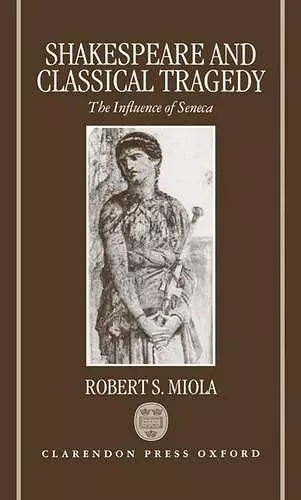Shakespeare and Classical Tragedy
The Influence of Seneca
Format:Hardback
Publisher:Oxford University Press
Published:18th Jun '92
Currently unavailable, and unfortunately no date known when it will be back

This book charts the influence of Seneca - both as specific text and inherited tradition - through an analysis of Shakespeare's tragedies. Discerning patterns in previously attested borrowings and discovering new indebtedness, it presents an integrated and comprehensive assessment. Familiar methods of source study and a sophisticated understanding of intertextuality are employed to re-evaluate the much maligned Seneca in the light of his Greek antecedents, Renaissance translations and commentaries, and dramatic adaptations, especially those of Chapman, Jonson, Marston, Garnier, Cinthio, and Dolce. Three broad categories organize the discussion - Senecan revenge, tyranny, and furore - and each is illustrated by an earlier and later Shakespearean tragedy. The author keeps in view Shakespeare's eclecticism, his habit of combining disparate sources and conventions, as well as the rich history of literary criticism and theatrical interpretation. The book concludes by discussing Seneca's presence in Renaissance comedy and, more important, in that new and fascinating hybrid genre, tragicomedy.
`a detailed, learned and rewarding examination of a number of Senecan motifs ... Professor Miola has written a book of lasting importance.' A Journal of English Language and Literature, Vol 74, No 6 (Dec 1993)
`tightly organized, richly documented, and carefully articulated ... a sensitive analysis of a culture's and a writer's use of Senecan characters, conventions, and rhetoric ... Miola's analysis is consistently subtle and persuasive. Shakespeare and Classical tragedy is a sophisticated study that well deserves our attention.' Sixteenth Century Journal XXXIV/4 (1993)
`Miola's method reveals itself to be impressively eclectic and adventurous ... an impressive, scholarly book that is not only well written and lucid but extremely illuminating.' Martin Coyle, University of Wales, Cardiff, Notes and Queries, September 1993
'Adept in discerning possible classical influences, Miola's book refines our vision of the playwright at work, adding another lens through whch to view his accomplishment without drastically changing the old prescription.' Paula S., Berggren, Baruch College of CUNY, Classical and Modern Literature, Fall 1993. Vol. 14, No.1
'In his book he presents a good deal of new evidence and no doubt offers many new insights, There is no doubt that Miola's new book has its qualities and merits for which we have to be grateful.' Wolfgang Riehle. Archiv
'... it is the accumulation of evidence and the demonstration of how profoundly the raw material is often transformed that is imprssive. Miola's work not only suggests a great deal about The Influence of Seneca, the book's subtitle, but it consistently takes the reader beyond source study, as any good book about sources always does.' C.B. Hardman. University of Reading. MLR Vol 89
this is a useful and lively survey...Students will thank Miola for discussing plays which others are content to mention as self-evident examples of Senecan influence, and they will find him thought-provoking. * Review of English Studies *
Unlike some books being published today, Miola's study produces exactly what its title promises ... the strength of the book lies in a series of close readings in which attention to New Comedy and its Renaissance contexts leads to some sharp observations about several of Shakespeare's plays ... this book is more than enough to establish Miola as an authority, if not the authority, on Shakespeare and Roman drama. * Craig Kallendorf, Texas A&M University, Renaissance Quarterly *
A companion piece to his fine Shakespeare and Classical Tragedy: The Influence of Seneca, this volume provides us with a wolid examination of the "influence of Plautus and Terence" that Shakespeare inherited as a part of the air he breathed ... a work of great value. * English Language Notes, December 1996 *
ISBN: 9780198112648
Dimensions: 225mm x 145mm x 19mm
Weight: 415g
234 pages